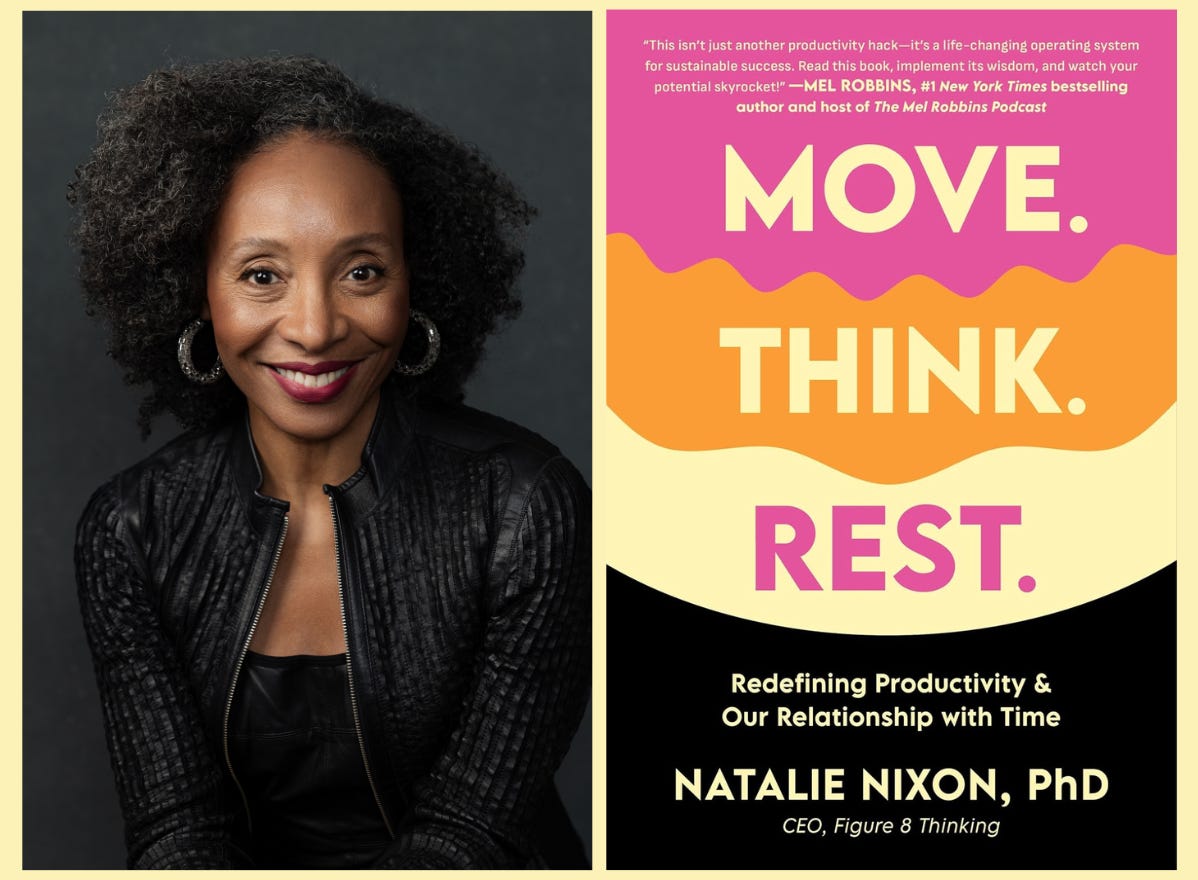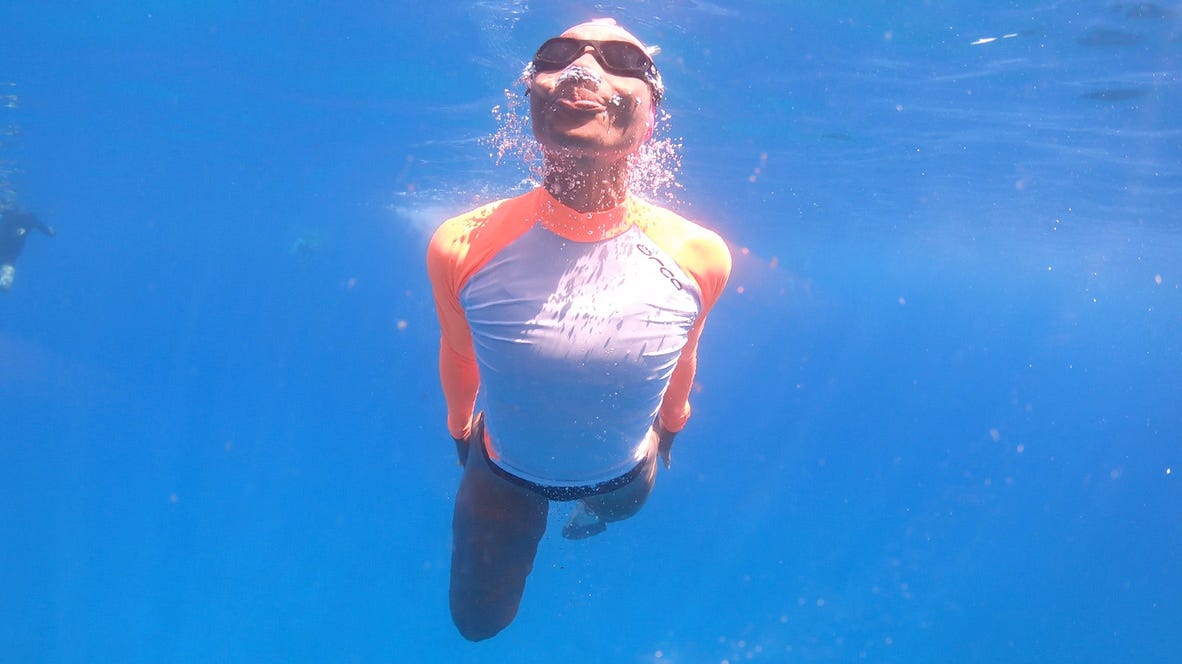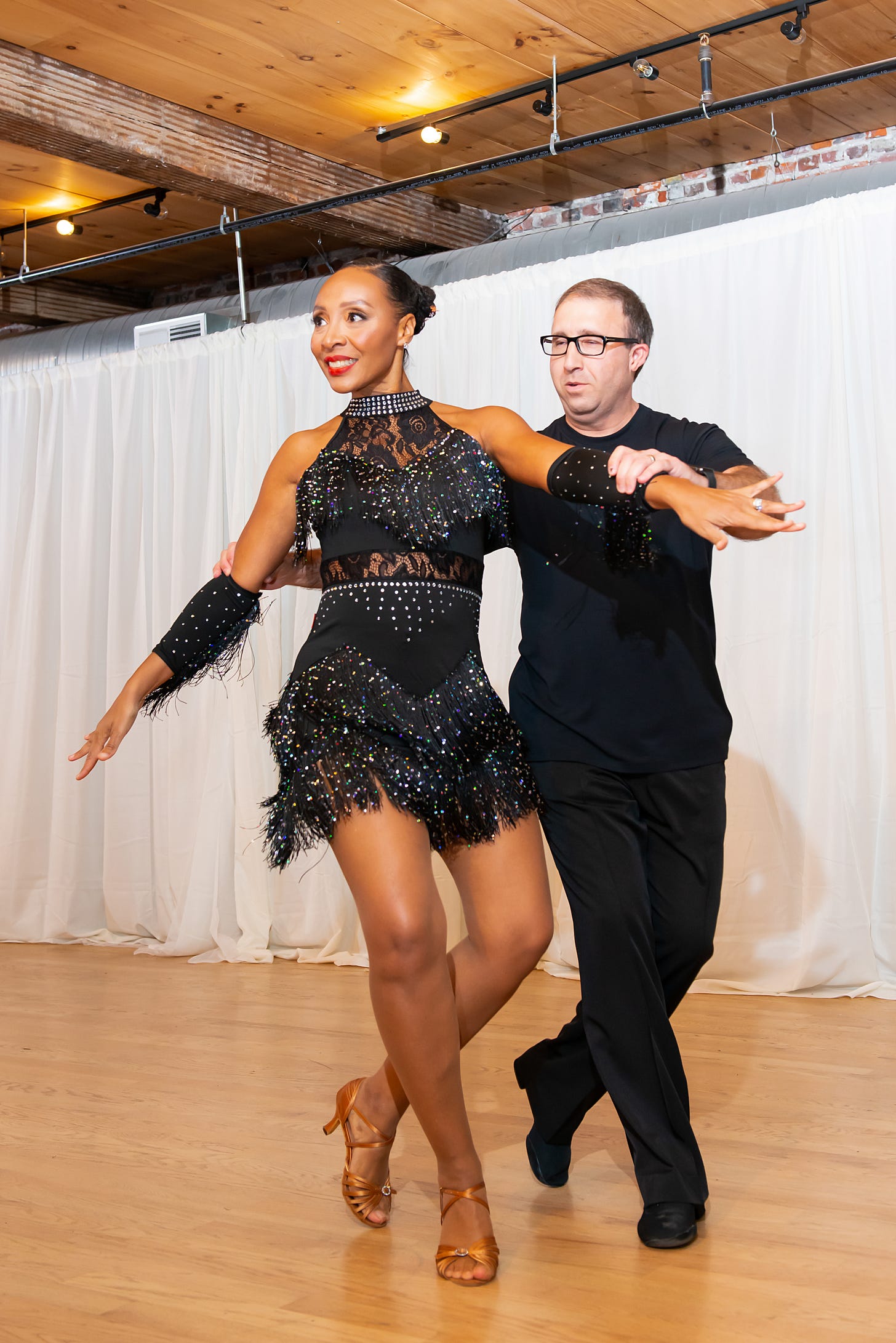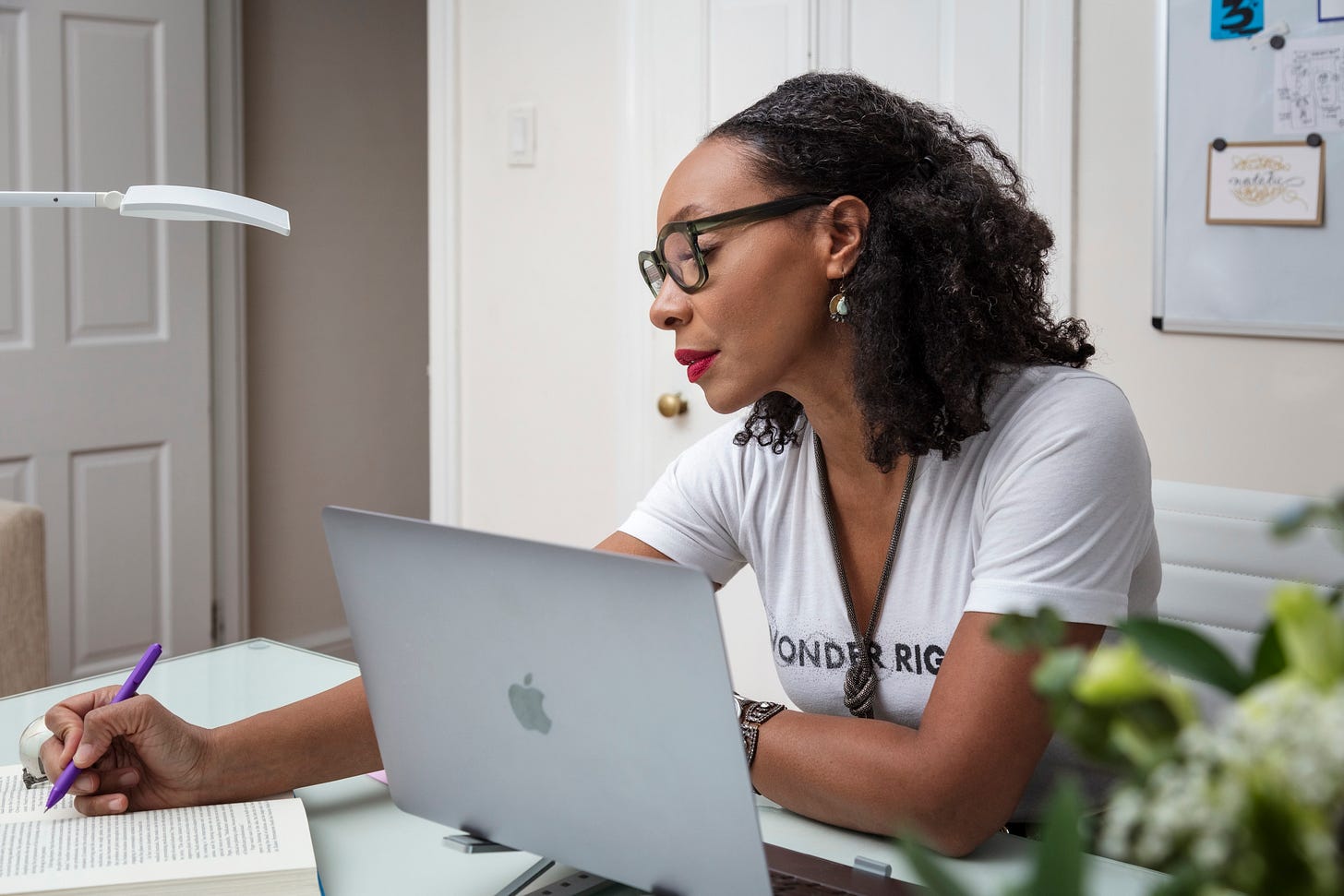Stop Chasing Productivity, Start Cultivating Creativity
21 Questions with Natalie Nixon on finding flow, capturing ideas, and building a sustainable writing life
What does it take to rethink productivity itself? For Natalie Nixon, the answer starts with creativity—wonder, rigor, and yes, the courage to actually block off your calendar (radical, I know). A globally recognized creativity strategist, speaker, and author, Natalie helps leaders reimagine how they work and innovate. Her new book, Move. Think. Rest. Redefining Productivity and Our Relationship with Time, challenges the industrial-age obsession with efficiency and instead asks a more generative question: What might I cultivate?
In this 21 Questions, Natalie shares the story of her two-week writing sabbatical (equal parts terrifying and transformative), the tech tools that keep her ideas flowing, and why she’s just as likely to spark insights in a supermarket aisle as in a boardroom. She also talks about the power of comparison-free wins, the rituals that keep her grounded, and the mindset shift that’s helped her embrace progress over perfection.
—Panio
21 Questions for Natalie Nixon
1. I couldn’t have written my last book without… committing to a two-week writing sabbatical. My husband, John, encouraged me to try that. I resisted because I have a perfectly nice home office. And then I realized I should practice what I preach in the book that I was attempting to write. It was scary at first to block off two weeks in May where I would say no to meetings, say no to calls and no to keynotes. But step # 1 was blocking off the two weeks on the calendar. And then, I texted five different friends for recommendations about where to go: I am going on a writing sabbatical from May 13 - May 28. I am envisioning myself writing every day from 8am to 2pm and then swimming in turquoise water at the end of the day. Any suggestions? Within 40 minutes, one of those friends offered to lease me her beachside condo in Miami.
So, I went. And it was simultaneously romantic (in the most classical of senses) and also terrifying. Because I had no excuse but to just write. My developmental editor gave me daily tasks—I love homework, so that was helpful. My goal was to get three chapters written, and I wrote two. So, not bad at all. Plus I peppered in my evenings with Cuban salsa dance lessons, swimming every day and catching up with friends over a few dinners. I highly recommend it!
2. What’s the thing most people get wrong about being a writer? I think a lot of people think that writing "just comes easy to some people.” But writing is hard. It takes focus, discipline and lots of positive self-talk. And a healthy dose of audacious imagination. But then man, in those times when you do get in the flow, it’s really cool.
3. Hemingway wrote standing up; Edith Wharton, lying down. What are your quirks? I like to speak out my ideas first. So I have started dictating a brain dump into my phone using the Otter app, and then go back to make sense of it. It kind of feels like collecting scraps of fabric to make a quilt. I also like a clear desk and I burn incense; it helps me to inhale deeply and feel calm.
4. Is there a book you wish you’d written? I don’t wish I’d written his books, but I wish I had the mad-skills of the polymath Abraham Verghese. I marvel at his storytelling ability. I admire his accomplishments to be both an excellent surgeon and a really great fiction writer. I would like to write a wonderful novel one day.
5. What keeps you up at night? The stuff that shouldn’t: comparing myself to others, getting impatient. Basically, when I forget to count the small bits as incredible miracles and blessings. After reading Hardy & Sullivan's The Gap and The Gain I started keeping a WINS journal. I record three wins just about every day. And that has helped me to not go down the comparison drain.
6. Have any tech tools made your job easier? Yes! Otter, because I like to talk out my ideas. Also, Evernote: it is a compendium of notes, ideas and doodles over the years. I also really like dipping into the FLOWN community [virtual co-working]. It felt weird at first, but it really helps with focus. I call it “asynchronous synchronicity.”
7. What new tools or distribution channels do you want to try? I want to produce and post a lot more video. Converting my IP into courses is a big project for 2026. Vodcasting as a top of the funnel way to share my content on YouTube, and develop a more organized YouTube channel are all short term goals.
8. How has AI changed your writing process? It helps me to get unstuck; to fact check (and then fact check again); and to explore different ways to segment out my content. For example, I will never forget the first time I plugged in the pdf of The Creativity Leap and prompted the algorithm to develop a 10-module course with learning outcomes and discussion questions… and, in 3.7 seconds what it produced was an awesome starting place. Not bad at all!
9. Where do you find new ideas? I find new ideas by traveling—and I don’t even mean to foreign countries—I mean any travel outside of my norm that allows me to be an eavesdropper and observer: on trains; in a different supermarket. I also get ideas during ballroom dance lessons, because the good ballroom dance teachers are excellent at metaphor!
10. How do you keep track of new ideas? With the Notes app on my phone and with Evernote.
11. What’s the best piece of professional advice you’ve ever received? At a low point when I was writing my PhD dissertation (and working full time) I was very stressed out over some minutiae, and my principal advisor, Alison Rieple, leaned back in her chair, looked at me and said, “Right. Hopefully this will not be your best piece of work. Hopefully, you will go on and do far greater things!” That shook me out of my self-pity and reminded me to not take myself so seriously. And to have perspective, that every experience is a building block. Alison was basically telling me to not let perfection be the enemy of the good. In other words, keep it movin'.
12. And the worst? When I was a young assistant professor considering doing a PhD, a provost told me not to bother, that it would take me out of the job market. Considering that she did have a PhD, I ignored her and persisted on asking others for advice. I serendipitously learned about a doctoral program in the UK that I could earn while working full time. It was not the easiest thing to do, but boy did it stretch me in exciting ways. A lot of the time, intuition serves as the greatest compass.
13. What is the one piece of advice you would give to recent graduates that want to make a living as a writer? Pursue all of your interests and learn by doing so that you actually have something to write about!
14. How did you find your agent? Through Megan Stevenson. I took her authors’ bootcamp and hired her to help me write my book proposal for what has become Move.Think. Rest. She then introduced me to a number of agents. I landed with Steve Troha & Jan Baumer at Folio Literary.
15. Coffee, tea, or something stronger? A hot oat milk matcha latte with honey.
16. What's the most effective way you've found to build your email list? I offer free downloads and access to my newsletter on my website, for example, The WonderRigor™ Tip Sheet. I also offer summaries and tip sheets at the end of keynotes that people access after sharing their name and email.
17. How are you using social media to grow your audience? I use LinkedIn a lot to raise awareness about my ideas and content. I’ve produced three LinkedIn Learning courses and that has helped a lot. My IG account is a bit more humble.
18. How many drafts before you show your editor? One to three.
19. Can you describe your ideal workday? Start with a 30-minute body stretch. At my desk by 7 am and do all my deep thinking work in the morning; intermittent breaks that last 10 minutes; sometimes a brief walk; sometimes a daydream break; clock off by 2 pm. No more than two Zoom calls max. Save getting through email for the last portion of the work day.
20. How does that compare to your actual workday? My actual work days are inconsistent, and I am not successful at always doing my deep work first, early in the morning.
21. What is your new book about? Move. Think. Rest. Redefining Productivity and Our Relationship with Time offers a human centered operating system for individuals and teams to flourish and build creativity as a strategic competency, due to burn out, ubiquitous technology, and new rules for remote work. It’s a provocation that the ways we have been thinking about productivity are a relic of the first industrial revolution. It suggests that instead of asking “How might I be more productive?” we should instead ask “What might I cultivate?”
P.S. Move. Think. Rest. just released this week! Natalie would love your support in reading it and sharing it with your networks.
Your turn→ Have you found creative ways to turn your writing into something bigger, like a course, program, or something we haven’t even thought of? Share your story in the comments.






Polymathy is not about “many skills.”
It is a potential category: a trajectory of becoming, not a résumé.
A polymath orients beyond skills — from less subject to more subject, from swarm-conditioning to autonomy, from scattered curiosity to mission-driven coherence.
That is why I speak of Polymath on Mission: not as a boast, but as a stance — to embody more being and less conditioning, to turn orientation into creation.